-
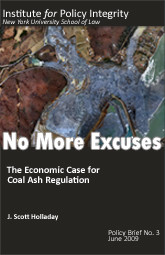
No More Excuses
The Economic Case for Coal Ash Regulation
No More Excuses: The Economic Case for Coal Ash Regulation is a brief but careful analysis which reveals several compelling findings on the regulation of the toxic by-product of coal combustion. In broad strokes, it is clear that the benefits of regulating coal ash storage facilities would far outweigh the costs. The benefits of a regulation requiring coal ash to be stored in dry conditions and in synthetically-lined, covered facilities could save tens or even hundreds of millions of dollars per storage facility.
-
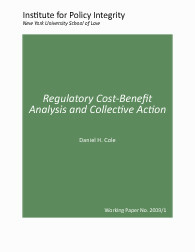
Regulatory Cost-Benefit Analysis and Collective Action
In Regulatory Cost-Benefit Analysis and Collective Action, Daniel H. Cole describes the influence of cost-benefit analysis and explains how and why it is a politically useful tools for agencies, even when those agencies are not required by law to prepare regulatory cost-benefit analyses (RCBA). As Cole says in his introduction, “For better or for worse, RCBAs have significantly influenced policies for dealing with, or not dealing with, collective action problems ranging from airport enlargement to global climate change.”
-
_110_170_90.jpg)
Federalism Accountability
“Agency Forcing” Measures
In Federalism Accountability: “Agency Forcing” Measures, author Catherine M. Sharkey advocates a variety of “agency-forcing” measures designed to enhance the ability of Congress, the executive, and especially the courts to ensure that agencies abide by executive mandates and other reforms, and to provide a check on overt politicization or inaction on agencies’ part.
-
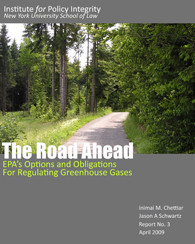
The Road Ahead
EPA’s Options and Obligations for Regulating Greenhouse Gases
This detailed legal analysis provides an in-depth and thorough discussion of greenhouse gas regulation under the Clean Air Act answering the questions: What are EPA’s obligations under the Clean Air Act, and how far can and should the agency go to regulate greenhouse gases?
-
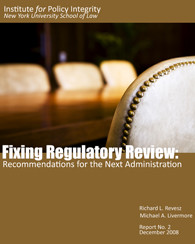
Fixing Regulatory Review
Recommendations for the Next Administration
Fixing Regulatory Review: Recommendations for the Next Administration provides a set of recommendations for the Obama Administration to improve the process of regulatory review. It includes ten principles that should inform regulatory review and cost-benefit analysis of regulation, as well as a detailed markup of the Executive Order signed by President William Jefferson Clinton that established the structure of review that is currently in place.
-
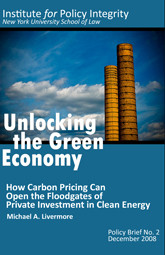
Unlocking the Green Economy
How Carbon Pricing Can Open the Floodgates of Private Investment in Clean Energy
Unlocking the Green Economy: How Carbon Pricing Can Open the Floodgates of Private Investment in Clean Energy calls for the Obama Administration to implement carbon pricing as a necessary step to transition to a green U.S. economy.
-
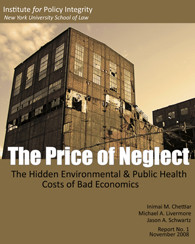
The Price of Neglect
The Hidden Environmental and Public Health Costs of Bad Economics
This report examines the regulatory failures of the Bush years on issues as wide-ranging as climate change and workplace safety, and concludes that these failures did not arise because of an overuse of economics, but because economic and scientific evidence was ignored.
-
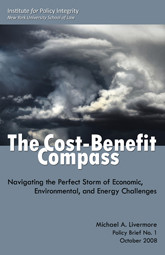
The Cost-Benefit Compass
Navigating the Perfect Storm of Economic, Environmental, and Energy Challenges
The Cost-Benefit Compass: Navigating the Perfect Storm of Economic, Environmental, and Energy Challenges discusses how the next administration can use cost-benefit analysis to address the three great interrelated challenges facing the country.
-

Cause or Cure?
Cost-Benefit Analysis and Regulatory Gridlock
In Cause or Cure?: Cost-Benefit Analysis and Regulatory Gridlock, Michael A. Livermore argues that cost-benefit analysis can be used to overcome regulatory paralysis. An earlier version of this working paper was presented at the Breaking the Logjam Conference at NYU Law in the spring of 2008.
-
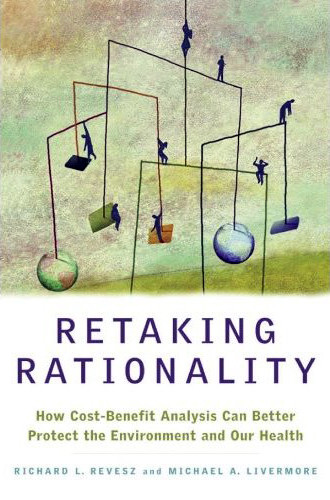
Retaking Rationality
How Cost-Benefit Analysis Can Better Protect the Environment and Our Health
In Retaking Rationality: How Cost-Benefit Analysis Can Better Protect the Environment and Our Health (Oxford University Press, 2008), Dean Richard L. Revesz and Michael A. Livermore argue for a more rational approach to cost-benefit analysis and regulation. They show how traditional cost-benefit analysis tends to overestimate costs and underestimate benefits, leading to less-than-optimal levels of regulation.
Viewing recent projects in Publications
